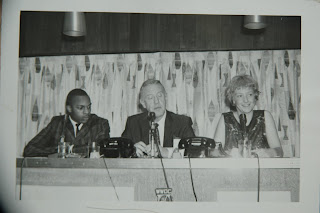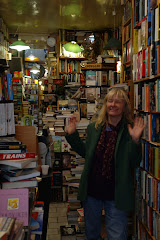
Sunday, November 2, 2008: I am trying to hold down the rising sense of anticipation and pride within me, the sense that something very very good is on the horizon, is about to happen. GOOD NEWS finally, for me, for my friends and family (especially for my young nephews and nieces), for my country and for my world! As I write this, the 2008 presidential election is still two days away, and as many commentators like to remind us, “anything can still happen.” And yet, for the first time in all these weeks and months, I can feel change in the air, I am starting to feel confident that the miracle will in fact take place—that the horrible Bush years will soon be behind us, and that as an American living in Europe, I will at last be able to stop blushing and apologizing for my country, stop having to shake my head and repeat for the umpteenth time, “I don’t know, I don’t understand it either, how ‘they’ could have elected Bush!” Distancing myself from “them”, from “over there”, from my own country, disowning it, implying that “they” and “me” are very different entities.
But of course, despite my adopted French nationality, I remain profoundly American, and never is this more evident than during a US presidential election. My French friends are of course interested, well-informed, and concerned about what happens in the U.S. But none of them are as involved as I am during a presidential campaign, and they do not suffer as I do over the great defeats (2000, 2004 in particular), nor will they be able to experience the tremendous joy I fully expect to feel early Wednesday morning Paris time, say, about 2am (8 pm New York time). I will be up, I will be at my computer, I will be unable to sleep that night or wait until morning to learn the results. For, as a citizen of the US, most powerful country in the world, I cannot avoid, as no concerned American can avoid, feeling a sense of responsibility—and often shame—for my country’s actions. This is what distinguishes me from my fellow French. (Yet, now, being a French citizen also, I feel a double responsibility—for the actions of two countries around the world!)
And if, as I now am coming to believe, Barack Obama is named the next president of the United States, my French friends will be thrilled and happy but they will not feel the primary emotion I expect to feel—pride! I will finally be able to hold my head up again as an American. I will be representing from that moment on, a country that has chosen to look outward rather than inward, and that has for the majority of its citizens at least put the notorious racism that has dogged our country for so long behind it, has judged a man not by the tint of his skin but by his intellect, his gifts, his qualities to be a good leader,. When I was eighteen years old, the summer of 1963, I arrived in Washington D.C. just before the great March on Washington. I had gotten a job in a Florida congressman’s office. When I announced I was planning to march, I caused fear and consternation in that office—the others were all planning to stay home with their doors locked! I had no one to march with but that didn’t deter me. I found in a newspaper the name of a church where marchers were meeting, and early the morning of August 28, I was at that church. It turned out to be a black church, but instead of being ignored, I was heartily welcomed, and I will never forget one old man coming up to me and taking off the huge button that read “I WAS A CIVIL RIGHTS MARCHER, AUGUST 28, 1963” right off his own chest and handing it to me! I wore it all that day, and I have it yet. Nor of course can I ever forget standing with my fellow Americans black and white under a tree along the Reflecting Pool and listening to Martin Luther King’s voice ringing out so powerfully with the speech to become so famous “I have a dream.” I went home after that incredible day and wrote my first journalistic piece, recounting my experience that day (story which was published in the Oregon newspapers and in the Congressional Digest).
When I was nineteen years old, I fell in love with a fellow student at Georgetown whose skin tint was also different from my own. It was 1964. We worked hand in hand for the 1964 Bill of Rights. We desegregated a “whites only” beach just half an hour from our nation’s capitol. We faced down a neo-Nazi who saw us sitting on a park bench and stood with arms folded and expression full of hate right in front of us, unmoving. When our pictures were in a Washington newspaper together (speaking at a demonstration for the civil rights bill), I received hate mail sent through the newspaper.
Later, I worked in the small Mississippi town of Grenada, just a few miles away from where three white civil rights workers had been murdered. the summer before. My cousin and I joined a boycott of the downtown white stores, and were spit upon as we marched around the square.
Those years were also the years of the assassinations. President Kennedy. His brother Robert Kennedy. And when Dr. King was shot down too, it really did seem to be the end of the dream Then came the Nixon years, and I left the country, never to return there to live again.
There have been ups and downs since then in my country’s history, it hasn’t all been bad, but there also hasn’t been a whole lot to feel much pride about since then.
Until now.
I wasn’t even an Obama supporter at the beginning of this campaign. I supported the lovely and competent Hillary Clinton all the way through the primaries, and had the great privilege of voting for her in my Oregon primary election. I think she would have made a fine president, and her election as a woman would also have been highly symbolic, and perhaps I will live to one day see a woman in the White House. But I do believe that Barack Obama’s election will have an even greater symbolic import than would Hillary Clinton’s at this particular moment in our world’s history. America’s reputation is in tatters. Our country, once a symbol of liberty and democracy however imperfect, is today hated by many of the world’s people (among whom there is a great range and variety of skin tints!). But if the election goes as it should Tuesday, while the world will not instantly change, the peoples of the world will instantly have a different vision of America. I believe there will be an immediate rise of good-will toward my country from all around the world and that Barack Obama will know how to profit from this good will, make America worthy of it once again, and so increase it rather than, as Bush has done, squander and dilapidate it. This is my hope.
I can hardly wait for Wednesday. I wish I had a button I could pin on my chest saying, “I AM AN AMERICAN, AND FINALLY PROUD TO BE ONE, November 4, 2008.”




